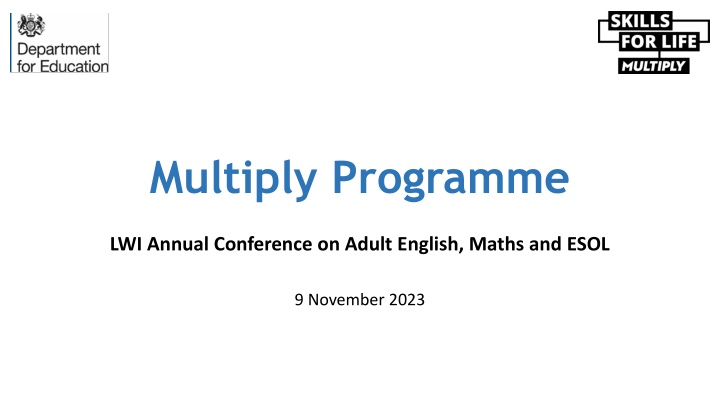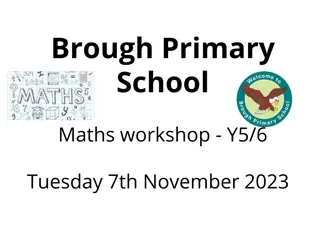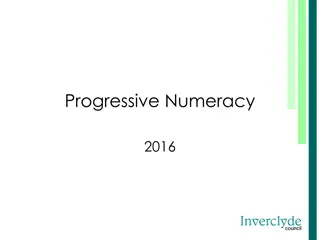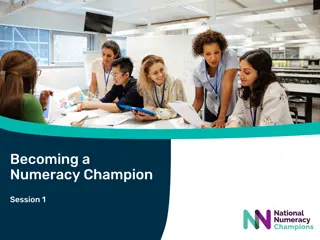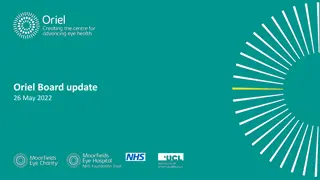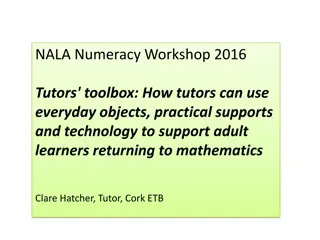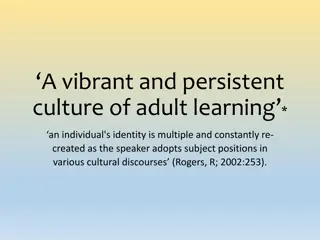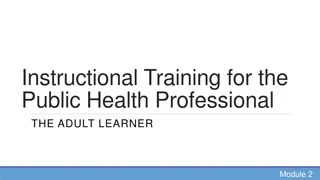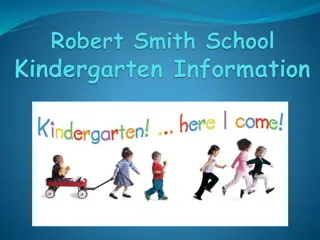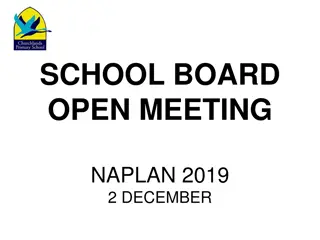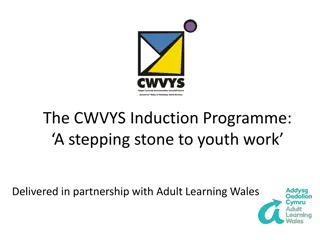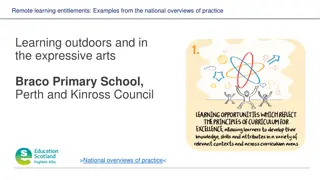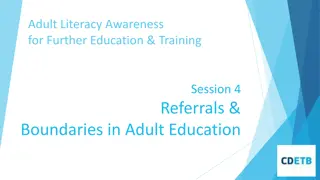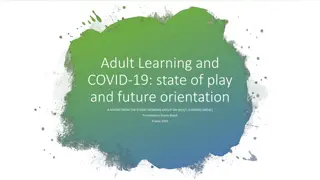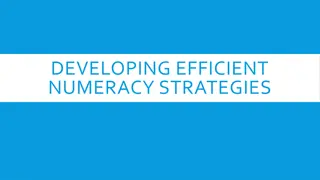Multiply Programme: Enhancing Adult Numeracy Across the UK
A fully funded initiative, Multiply Programme aims to improve adult numeracy skills in the UK. With an emphasis on innovative interventions, the program targets hard-to-reach populations to boost confidence with numbers, enhance employability, and increase access to formal qualifications. Local areas are delivering tailored numeracy courses to support over 100,000 learners in gaining vital math skills for daily life and career advancement, fostering a numerate workforce and driving economic growth.
Download Presentation

Please find below an Image/Link to download the presentation.
The content on the website is provided AS IS for your information and personal use only. It may not be sold, licensed, or shared on other websites without obtaining consent from the author.If you encounter any issues during the download, it is possible that the publisher has removed the file from their server.
You are allowed to download the files provided on this website for personal or commercial use, subject to the condition that they are used lawfully. All files are the property of their respective owners.
The content on the website is provided AS IS for your information and personal use only. It may not be sold, licensed, or shared on other websites without obtaining consent from the author.
E N D
Presentation Transcript
Multiply Programme LWI Annual Conference on Adult English, Maths and ESOL 9 November 2023
Up to 270m allocated to local areas across England, to improve adult numeracy, through the UK Shared Prosperity Fund Multiply was announced in the 2021 Budget and Spending Review The number of adults studying Maths in England up to Level 2 has declined over the past decade. Multiply aims to reverse this trend The programme aims to increase adult numeracy across the UK and help people build their confidence with numbers so they can: - take the first steps towards formal numeracy qualifications - access higher levels of training - unlock work opportunities Overview Multiply is fully funded through the UK Shared Prosperity Fund Adults aged 19+ without a GCSE grade C/4 or equivalent in maths Target audience Focus on our hard to reach priority cohorts such as prisoners, those leaving the prisons and care systems and those that are out of work.
Innovative numeracy interventions that meet the needs of local people A core part of the programme involves local areas across the UK delivering bespoke adult numeracy interventions, within the framework set out in our (and the UKSPF) investment prospectus. What are we doing? We are building the evidence base on what works to improve adult numeracy. There will also be an evaluation of the programme. More adults achieving maths qualifications / participating in numeracy courses up to, and including, Level 2 Improved labour market outcomes for example specific benefits to businesses, supporting people to enter work or progress in work Programme Benefits Increased adult numeracy this overall impact will track the difference taking part in the programme makes in supporting learners to improve their understanding and use of maths in their daily lives, and to feel more confident when doing so.
Multiply local allocations delivery is underway across England Over 20,000 people have participated in substantive learning. Over 20,000 people have engaged through outreach focused provision. Over 2,000 different types of provision are running. So far in FY23/24 Most delivery so far is through interventions a) to increase confidence, and i) aimed at engaging the hardest to reach learners. Very good progress on intervention b) courses designed to help people use numeracy to manage their money. Slow progress so far on c) innovative numeracy programmes delivered together with employers. Over 44,000 starts recorded on the ILR up to April 2023. ILR data Those engaging through Multiply are not captured in the ILR. Local areas expect over 100,000 learners to participate in substantive learning Expectations for FY23/24 Over 75,000 people are expected to engage in outreach-focused provision.
Substantive learners expectations for year 2 and Q1 progress against each intervention a) Courses designed to increase confidence with numbers for those needing the first steps towards formal numeracy qualifications. b) Courses designed to help people use numeracy to manage their money. c) Innovative numeracy programmes delivered together with employers - including courses designed to cover specific numeracy skills required in the workplace. d) Courses aimed at people who can't apply for certain jobs because of lack of numeracy skills and/or to encourage people to upskill in numeracy order to access a certain job/career. e) New intensive and flexible numeracy courses targeted at people without Level 2 maths, leading to a Functional Skills Qualification. f) Courses for parents wanting to increase their numeracy skills in order to help their children, and help with their own progression. g) Numeracy courses aimed at prisoners, those recently released from prison or on temporary licence. h) Numeracy courses aimed at those 19 or over that are leaving, or have just left, the care system. i) Numeracy activities, courses or provision developed in partnership with community organisations and other partners aimed at engaging the hardest to reach learners. j) Additional relevant maths modules embedded into other vocational courses.
"What Works" pillar of the Multiply programme: to build the evidence base on what works to improve adult numeracy Build the evidence base on what works to improve adult numeracy including through Randomised Controlled Trials (RCTs) Objective 1. Systematic Review: what do we already know and how reliable is the evidence base? Literature review to identify and assess the quality of evidence over the last 20 years (including international). Status: completed, published 26th January 2023 2. Programme Wide Evaluation: what impact did the Multiply programme have as a whole? Was it a success? Status: evaluator appointed, and data collection has begun. Three elements 3. Randomised control and quasi-experimental trials: which approaches to learning make the most difference to adult learner outcomes and by how much? A series of experiments to isolate the impact of specific approaches to engaging, motivating, supporting and teaching hard-to-reach adult learners to be able to identify (in a statistically robust way) which actually work when compared to a control group
What Works Randomised Control Trials Learning Providers . Indicative Timeline: TBC Sept 2025 Expected end-date for trial delivery (some trials will end sooner) November 2023 June 2024 Start recruitment of partners, implement delivery agreements, oversee setup of interventions January 2024 Fieldwork begins (for some trials) October contract signed for Delivery Supplier April Evaluation supplier appointed Products for trials - development ongoing
Idea Description Confidence workshops Confidence workshops focused on building confidence and challenging negative thoughts associated with maths. Numeracy Champions (employers) Specially trained 'numeracy champions' embedded in workplaces to engage people with numeracy needs, including signposting to programmes. Numeracy Champions (local areas) Specially trained 'numeracy champions' embedded in local areas to engage people with numeracy needs, including signposting to programmes. Personalised assessment Personalised numeracy needs assessment, followed by signposting and support with signing up for relevant provision. Preparation for Maths GCSE Preparation for Maths GCSE study skills sessions embedded into Maths GCSE. Family Numeracy Maths sessions taught to families in their children's school Mastery Approach Embedding the use of maths mastery teaching approaches in existing courses. Maths by Stealth Embedding maths 'by stealth' in a vocational course Contextualised Curriculum Embedding the use of contextualised/applied teaching approaches e.g. baking a cake, managing money, in existing curriculums - may involve the use of applied 'field trips' e.g. to a shop/food venue Comms trial 1: language in digital advertising Communication materials to encourage participation in Multiply engagement events Comms trial 2: encouraging progression Letters to existing Multiply learners on non-regulated courses to encourage progression to a further qualification-bearing course. (Two forms of letters to be tested: one from a peer and one from/endorsed by employers) 8
Multiply RCTs how to get involved Our Delivery Supplier will be reaching out to providers in the coming weeks and months We're keen to hear from providers on initial thoughts on the RCTs: What are the benefits of involvement? Do you see any barriers? Do you have any concerns about being involved? Share your initial thoughts with the Multiply what works team: multiply.researchandevaluation@education.gov.uk
